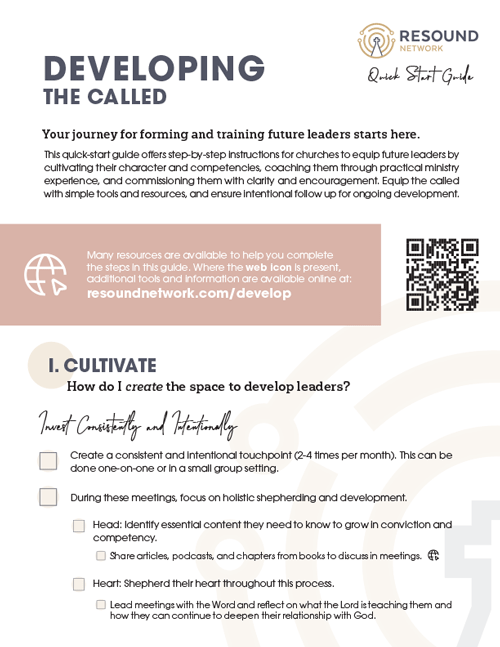Developing the Called
Your journey for forming and training future leaders starts here.
This quick-start guide offers step-by-step instructions for churches to equip future leaders by cultivating their character and competencies, coaching them through practical ministry experience, and commissioning them with clarity and encouragement. Equip the called with simple tools and resources, and ensure intentional follow up for ongoing development.
I. Cultivate
How do I create the space to develop leaders?
Create a consistent and intentional touchpoint (2-4 times per month). This can be done one-on-one or in a small group setting.
During these meetings, focus on holistic shepherding and development.
Head: Identify essential content they need to know to grow in conviction and competency.
Share articles, podcasts, and chapters from books to discuss in meetings.
(See Recommended Resources for Specific Roles at the bottom of this page).
Heart: Shepherd their heart throughout this process.
Lead meetings with the Word and reflect on what the Lord is teaching them and how they can continue to deepen their relationship with God.
Hands: Provide regular feedback and room for reflection on practical opportunities to grow.
Create opportunities for them to grow and develop in controlled environments such as leading an outreach project, directing a kids ministry event, or teaching a Sunday school or equipping class.
These need to strike a balance between stretching them so they can grow and also not hindering or hurting growth for the rest of the body as well.
As they are faithful with the little, give more weight and responsibility.
II. Coach
How do I use the created space to develop leaders?
Engage a simple development process: Model, Assist, Watch, Leave (MAWL).
Don’t do this alone. Encourage every leader in your church to invest in one other future leader via MAWL.
Create a role description with clear expectations and decision-making authority.
View an example (.pdf)
Levels of Decision-Making and Delegation (.pdf)
Embrace a posture of drawing out rather than merely directing by spending 70% of your time asking questions and 30% of your time providing guidance.
Use a simple framework for your coaching conversation.
Coaching Guide (.pdf)Share opportunities for development through Missouri Baptist Universities or Seminaries.
- For the Church Institute – Free online training for ministry leaders from MBTS
- Church Revitalization Minor/Certificate – Focused study for church renewal from MBU
- Master of Arts in Leadership – a 12-month online degree with an emphasis in Christian Ministry from HLGU
- Masters in Christian Ministry – Hybrid Masters degree from SBU with focused courses regarding leadership
After a season of development, use the Healthy Leader Assessment (.pdf) to evaluate growth.
Embrace the mess of leader development by expecting and engaging failure with grace and accountability.
Embrace patience, waiting with grace, as people develop. Keep in mind the vision of who they could be in three years given more opportunities and time.
III. Commission
How do I commission leaders who are ready?
Cast vision for raising up other leaders by calling them to identify one person they can develop.
Provide a note and gift of encouragement.
Pray for them with other leaders.
Deploy them publicly with the resources they need via the Deploying the Called Quick Start Guide.
Deploy QSG (web version)
Deploy QSG (.pdf)

